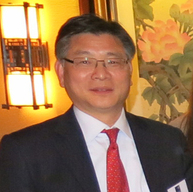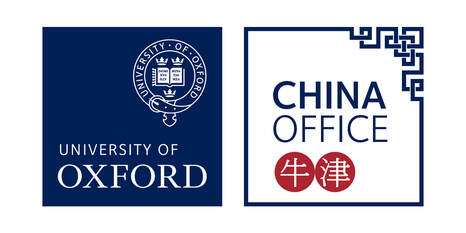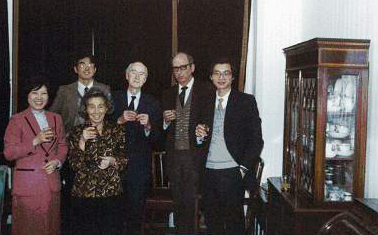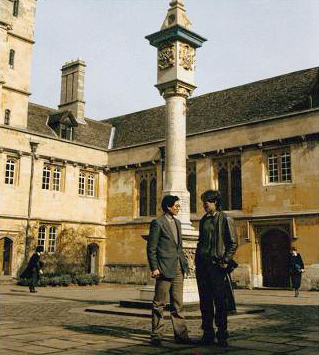Encounters with Alumni from Greater China

Chen Xingdong (Corpus Christi 1986) has been the
managing director and Chief China Economist of BNP Paribas since 1998 and is
based in Beijing. Previously, he worked for Peregrine Group, Crosby,
SocGen-Crosby securities Ltd., the World Bank, and the State Commission for
Economic Restructuring of China State Council. He graduated from Peking
University with a Bachelor and a Master’s degree in Economics, respectively in
1983 and 1985. He went to Oxford for intensive study at Corpus Christi under
the economic training program (ETP) for young profession officials during the
period of October 1986 to February 1988. Apart from his professional job, Mr.
Chen is part-time professor of School of Economics of Peking University. He was
the director and Chairman of the Board of Trustee of Caincross Foundation. The
foundation has sponsored many research and training programmes in Oxford.
The round-table alumni dinner hosted by the Vice Chancellor Professor Andrew Hamilton in March this year made me recall the good times I spent in Oxford between October 1986 and February 1988.
In order to promote China's market-oriented reform, Sir Alex Cairncross suggested in 1985 that the Chinese government set up an economic training program (ETP) to train young professional officials in market economics in universities in the west. Sir Alex set up the Center for China Study in Oxford and led the program as the chairman, while Dr. Cyril Lin ran the program as the executive director. Dr. Guo Shuqing (St Anthony’s, 1986) was the first trainee of the program sponsored by the Ford Foundation.
After the ETP was launched, I was one of the three people selected in the first group from the State Commission for Economic Restructuring of the State Council, and I arrived in Corpus Christi College in October 1986. The dean of the college welcomed me as the first student from the People's Republic of China to the college. He reminded me that as I was now in the UK, I should ride my bicycle on the left-hand side of road.
My other colleagues, Wang Haijun and Jin Lizuo, went to St Anthony’s and Wolfson respectively. Guo Shuqing was also at Oxford at the same time as us, but he was sponsored by the Ford Foundation, while the three of us were sponsored by the United Nation Development Program (UNDP).
The round-table alumni dinner hosted by the Vice Chancellor Professor Andrew Hamilton in March this year made me recall the good times I spent in Oxford between October 1986 and February 1988.
In order to promote China's market-oriented reform, Sir Alex Cairncross suggested in 1985 that the Chinese government set up an economic training program (ETP) to train young professional officials in market economics in universities in the west. Sir Alex set up the Center for China Study in Oxford and led the program as the chairman, while Dr. Cyril Lin ran the program as the executive director. Dr. Guo Shuqing (St Anthony’s, 1986) was the first trainee of the program sponsored by the Ford Foundation.
After the ETP was launched, I was one of the three people selected in the first group from the State Commission for Economic Restructuring of the State Council, and I arrived in Corpus Christi College in October 1986. The dean of the college welcomed me as the first student from the People's Republic of China to the college. He reminded me that as I was now in the UK, I should ride my bicycle on the left-hand side of road.
My other colleagues, Wang Haijun and Jin Lizuo, went to St Anthony’s and Wolfson respectively. Guo Shuqing was also at Oxford at the same time as us, but he was sponsored by the Ford Foundation, while the three of us were sponsored by the United Nation Development Program (UNDP).
|
English comprehension was the first challenge I faced I arrived. While Mr. Peter Pierson, the deputy chief of the World Bank Resident Mission in Beijing at that time, believed I was competent to study in Oxford after he interviewed me, I was disappointed by my English immediately on the second day of my arrival. When I asked for directions to a bank in the center of Oxford to exchange some money, I found people were confused by my English, and it was hard for me to follow their long sentences. Luckily, with a good English teacher, after three months of intensive study and a lot of time spent in the language center, I was able to make a great leap in English comprehension.
|
If you asked me what impressed me the most in Oxford, I would say the tutorial system. I benefited a lot of from this system. The Center for China Study made very good arrangements for me and my colleagues with many tutorials. I know it was costly. But it gives students a unique chance to discuss with the tutors on specific topics. I spent a lot of time preparing for each tutorial discussion by reading many books on the same topics that tutors usually listed for me, and prepared discussion essays. Discussions during tutorials helped me to reclassify what I had studied in economics in Peking University and to clarify my thinking on both theories and their application.
During this period, I was mainly interested in monetary theory and policy, the theory of public finance and policy, and price theory and policy. This was mainly because of my job with the government and because of the ETP’s aims for economic reform in China, transforming its planning economy to a market economy.
Seminars were another good way to study at Oxford. I remember there was a lot of seminars everyday covering different topics, led by professors, lecturers, or students. I found the seminars very interesting, and their enhanced my knowledge, encouraged good debate and stimulated my thinking. It also gave me good practice at presenting. My experience with seminars in Oxford was good training for the global roadshow marketing presentations I’ve made in the past 20 years as the chief China economist of BNP Paribas.
Did I experience cultural shock? Yes, indeed. Let me recount an interesting story.
During this period, I was mainly interested in monetary theory and policy, the theory of public finance and policy, and price theory and policy. This was mainly because of my job with the government and because of the ETP’s aims for economic reform in China, transforming its planning economy to a market economy.
Seminars were another good way to study at Oxford. I remember there was a lot of seminars everyday covering different topics, led by professors, lecturers, or students. I found the seminars very interesting, and their enhanced my knowledge, encouraged good debate and stimulated my thinking. It also gave me good practice at presenting. My experience with seminars in Oxford was good training for the global roadshow marketing presentations I’ve made in the past 20 years as the chief China economist of BNP Paribas.
Did I experience cultural shock? Yes, indeed. Let me recount an interesting story.
|
One day in January 1987, I was surprised to receive an electricity bill amounted to approximately GBP150 from the financial department at my college. This amount was more than one third of my living budget. I checked with my college mates who lived in the same house. Their electricity bills were for around GBP50 or less. I complained to my college about my electric meter. The engineer checked it and told me that my electric meter was working in good order. The financier asked me how I used my electric heater. I said I kept it on for 24 hours a day!
I lived in the room at the top of the house on 149 Walton Street. It was a very cold winter in 1986/87. My room was quite large and the windows were not air tight. Cold wind blew in. Though the heater in my room was quite big, around 2000W, I never felt warm enough. My college mates told me they switched off the heaters when they slept, unto quilts, and when they left the rooms. I thought the heating was included in my room bill, and in Beijing we never switched off our heating during the entire winter in Beijing as we had central heating and hot water. --- Written in May 2013 --- |


